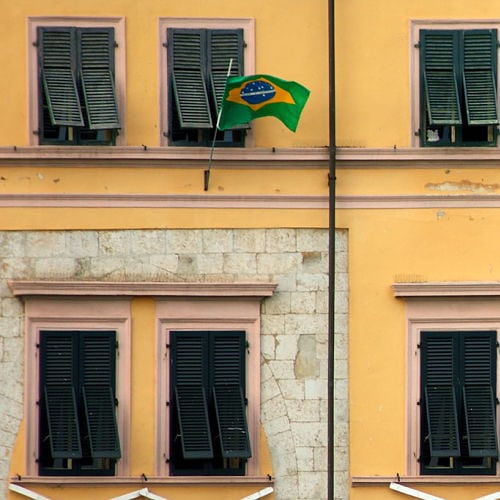Frequently, we Brazilian scholars have received concerned questions from foreign colleagues asking what the h… is happening in Brazil. In fact, the situation in the country since June 2013 has been somewhat complex, mixing in one single moment past, present, and expectations for the future. In other words, our condition combines still-fresh memories of the past — the 21 years of civilian-military dictatorship (1964-1985) — with the current threat of Bolsonaro-aligned groups to reinstate a State of Exception, with a complex mixture of neo-fascism that marries a neo-liberal economic agenda to social conservatism. As a result, the expectations for the future outline some unpleasant scenarios. Metaphorically, it feels like we were shooting a remake of Glauber Rocha’s “Terra em transe” with the aesthetics of a Spaghetti Western, but in which the political right-wing characters were inspired by Michael Haneke’s imagery. In summary, we face this situation that, it seems to me, never reaches a climax – rather confronting it with (un)organized resistance, activism or with a self-deprecating sense of humor, which reflects how we view, flabbergasted, the actions of government and state actors in this moment.
The situation of universities, especially public ones, is not very different. In fact, the pandemic allowed, in little over seventy days on Brazilian soil, air and organisms, the direct enactment of something that had been rehearsed for a long time concerning the future of public universities, and mainly of the Humanities and Social Sciences (HSS) in Brazilian universities. To get to this point a bit of political history and history of education in Brazil is fundamental. While historiography and historical research institutions were born during the reign of Emperor Dom Pedro II, in the 19th century, to provide meaning and legitimacy to the monarchical domination, throughout the 20th century, HSS have distanced themselves from the official discourse of the national state.
We built – with many contradictions, and even under a dictatorship — a very democratic space, connected to social reality and, finally, with a diversity that was one of the planet’s most interesting ones.
Gradually, although not uniformly, Brazilian intellectual writings in the HSS embraced the project of demonstrating the contradictions of leading national and international elites and their role in the making of Brazilian and Latin American inequalities – that is, it is widelyr accepted by scholars in the HSS that the concentration of income of Latin American elites produces social inequality.. In addition, gradually – and again I emphasize that this was not a uniform rule – books or articles that could possibly exalt oppressors, were being pushed out of the academic mainstream. Through this, over three or four generations, we built – with many contradictions, and even under a dictatorship — a very democratic space, connected to social reality and, finally, with a diversity that was one of the planet’s most interesting ones.
The making of the Bolsonaro era: Brazilian post-dictatorship denialism
However, precisely because of academia’s democratic tendencies, government officials and civilian ideologues often seek to disrupt this socio-intellectual construction, especially in authoritarian contexts. This was the case with the 1964 civilian-military coup, after which well-known Brazilian intellectuals were exiled by the dictators or went into exile because of the insecurities of the moment. During that time, all levels of education, from basic to high school to university courses, were subjected to reforms that, until today, have not been fully digested. And this is one of the strongest obstacles to imagining a more optimistic scenario for post-pandemic universities. History was abolished as a discipline during the military dictatorship; its resurgence as a subject in schools and as a university degree was strongly attacked for decades, in an attempt to marginalize the role of historians in contributing to analyses in formats of the so-called mainstream media. More recently, historians have systematically been stigmatized as “communists” by Bolsonaro-aligned followers.
Little by little, other HSS disciplines that have historically faced the same repressive structures have also come to be associated with a certain generalizing notion of “communism” — basically being equated with Stalinism and, for this reason, logically seen as violent, almost as “natural” murderers. This skewed view prevailed not only among the extreme right-wing, but also among “democratic” liberals. During the last decade, professional researchers, even those not integrated into institutional policy perspectives of political parties, were seen as esquerdopatas (left-o-paths), that is, seen as having an almost pathological left-wing or progressive political position. And this is only one example of the attacks on scholars in the HSS.
At the same time, there has been a rise in revisionist, denialist authors, who pushed narratives about national history and the political situation from an extreme right-wing viewpoint, blaming “communist” teachers for allegedly having lied about the history of Brazil for decades.
During the last decade, professional researchers were seen as esquerdopatas (left-o-paths), that is, seen as having an almost pathological left-wing or progressive political position.
A short genealogy of fundamental books in this anti-intellectual and/or denialist tradition must necessarily include William Waak’s Camaradas, (1993), the Politically Incorrect Guide to the History of Brazil, written by journalist Leandro Narloch (2009), together with other reinterpretations to soften Brazil’s brutal past by journalists or academics. Some of these books made waves when they were released, such as We are not racists (2006) written by Ali Kamel, a journalist, social scientist and the editor-in-chief of Rede Globo —Brazil’s largest commercial TV network — as well as Demétrio Magnoli’s anti-affirmative action manifesto entitled A Drop of Blood (2009). The historian Marco Antonio Villa promoted the Spanish concept of ditabranda – or “soft dictatorship” – in books such as Dictatorship, Brazilian-Style (1964-1985): democracy attacked from the right and the left (2014), much like other writers, who amalgamate with more or less complex arguments specific ideals of the authoritarian right. These ideas include the existence of a “leftist” conspiracy in the construction of narratives about Brazilian history; or that certain policies of segregation, social exclusion, dictatorship or even extermination would be justified to contain the violence of the “people” or the “communists”.
Just to give you one typical example of this pushback from the right: the collected volume Brasil: Nunca Mais (1985), compiled by various religious leaders from documents clandestinely collected between 1961 and 1979, reported 707 cases of political repression and torture in Brazil, generated huge controversy. This book seriously challenged the dictatorship’s master narrative, documenting instead the regime’s extensive human rights violations. Military supporters of the dictatorship riposted with the publication of The Suffocated Truth (2006), by General Carlos Alberto Brilhante Ustra. The head of the II. Army’s dreaded Department of Intelligence and Repression (DOI-CODI) from 1970 to 1974, and a proven torturer, Ustra is revered by the current president Jair Bolsonaro. Similarly, books, newspapers articles and videos by Olavo de Carvalho, an astrologer and digital influencer, popularized and “rebranded” the history of torture.
Training teachers, especially in the Humanities and Social Sciences, is economically damaging to these private corporations.
In addition to this, ever since the Lula and Dilma governments (2003-2016) decided to expand Brazilian universities, certain strategic roles were reserved for public universities, such as training teachers in the areas of Mathematics, Portuguese Language, and the humanities in general. Given the low salaries offered to teachers in both public and private education, private universities have increasingly reduced or even excluded their offers of these courses. Training teachers, especially in the Humanities and Social Sciences, is economically damaging to these private corporations. So, currently, publishing houses, mass media communication networks, or digital influencers assert that professional historians are not needed to write about history: they prefer to write history by themselves, reviving old prejudices – as mentioned above.
Future: Quicksand or coming to a stand still
Recently, there have been many attacks against the HSS by the Brazilian government: in 2019 the teaching of philosophy and arts in basic education was made no longer compulsory; resources for research in HSS was cut from 2019 onwards; and in 2020, President Bolsonaro decreed that “historian” would no longer be recognized as a distinct profession. What are concrete steps that scholars can take to resist this erosion and rethink the role of universities – especially in the social sciences – in the formation of real intellectual communities and for society? This question has no easy answers; after all, making predictions in this current moment is like walking on quicksand. What a historian can do, however, is to try and understand the possible scenarios for the post-pandemic era, especially for public universities and HSS.
It is important to tell foreign readers that Brazilian and South American universities tend to be privileged spaces for building citizenship.
For this reason, I sketch out two scenarios: in the first, not very optimistic one, I say that I do not believe that the post-pandemic era will destroy authoritarianism’s utopias related to the Humanities and Social Sciences. In other words, even with the truce that the mainstream press has offered to progressive movements in the past weeks, a utilitarian tendency predominates in the national public opinion: investments in these areas are considered only to be a waste. The second scenario, in my opinion, is that the resistance of associations, groups or institutions may find the cracks in the formerly well-structured alliance between neo-fascism and international capital. If so, we might be able to keep running even if we stand still, to riff off Lewis Carroll’s allegory of the Red Queen’s Race, until we can breathe in a more democratic context. For that, however, it will take a lot of effort from all democratic forces.
It is important to tell foreign readers that Brazilian and South American universities tend to be privileged spaces for building citizenship — especially the public ones, although not only these. In some ways, as scholars, researchers and teachers, we already have a certain expertise to deal with contexts of reconstruction: many groups and associations are building strategies to give visibility to our work during the pandemic, or resisting attacks against the university, such as the National History Association (ANPUH), the Brazilian Society for the History of Sciences (SBHC), or working groups in political history or public history, among others. Though this has often come at the cost of professors’ and students’ lives during the dictatorship, we have been demonstrating fantastic resilience in the struggle for democracy. Ultimately, this makes us think about and rethink the role of the Humanities and Social Sciences in the university and, consequently, of the university in social life. Some strategies already exist, but they must be reinforced, such as the Brazilian University Extension, a programme of outreach, which seeks to connect academic knowledge with — in the case of the institution where I work – the knowledges and practices of historically excluded social groups, such as indigenous peoples or landless workers. The difficulty, however, is that university extension has an implicitly inferior status within the humanities. That is, being a researcher gives you recognition – and access to fundings — much more than being an “extensionist”. Another strategy to rethink our role in university and in society is to build increasingly cohesive interdisciplinary groups to solve concrete problems, such as epidemics or pandemics. Historians of health and disease, as well as social scientists — I call attention mainly to the fundamental role of Anthropologists, but not only — have developed very important knowledge about tropical diseases or concepts of health and illness among indigenous populations. However, these topics, with the exception of some important research centers like Casa de Oswaldo Cruz do not attract the interest of young researchers. That is just one of the challenges, but persistence, resilience, and commitment are some of the characteristics of groups that resisted dictatorships and that will not perish in the era of fake news.
Featured image by Nicola Sap De Mitri on Flickr (CC BY-SA 2.0)







